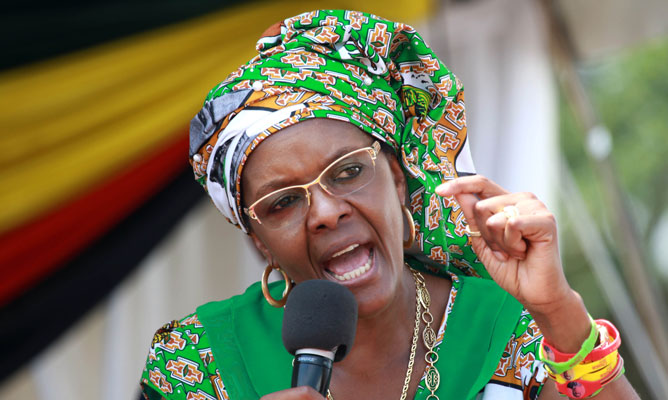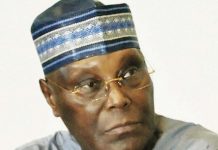It is ironic that of all the women of substance Africa has produced, it is the upstart first lady of Zimbabwe, Grace Mugabe, who is gradually trying to make history. Yes, history of sorts – the first serving first lady to head her country. Party endorsements and parades in honour of the first lady could signal the starting of political dynasty for the Mugabes in distraught Zimbabwe. Structures within the ruling ZANU-PF have been endorsing the young lady as a potential candidate for the vice presidency following the dismissal of Vice President Emmerson Mnangagwa, last week.
All the party’s provinces have rallied around the 52-year-old lady for the vice presidency, with her strongest support coming from the youth league and women’s league of ZANU-PF, which she leads.
Youth league leader, Kudzanai Chipanga, who organised a solidarity march in her honour last Wednesday, said she was the only person fit to take up the post. “As youth, we don’t believe in patriarchy; women can also be leaders. We want Grace Mugabe as our vice president because she can work well with the president and she can help him in leading the nation,” he said. The solidarity gathering was held to apologise to the first lady for being heckled by a small group of pro-Mnangagwa party youths in the second city of Bulawayo last weekend. The overwhelming support for Grace comes ahead of an extraordinary ZANU-PF congress to be held in the capital, Harare.
That gathering next month is set to endorse President Robert Mugabe as the party’s one centre of power and sole presidential candidate for 2018’s elections. Grace herself has not ruled out the possibility of becoming vice president, nor has she rejected claims that she aspires to succeed her husband. “My husband is the president, and I’m the president’s wife. I’m a woman, so why can’t I be the vice president? Am I not a child of Zimbabwe?” she said to crowds at a rally in the second city of Bulawayo at the weekend.
During the first years of their marriage in 1996, Grace had little involvement in political affairs and mainly focused on managing the family’s vast business and real estate interests in Zimbabwe and beyond.
Since her controversial attainment of a PhD in Sociology in 2014 – she was hastily awarded a doctorate from the University of Zimbabwe – and her election as first secretary of the ZANU-PF women’s league, she has become more involved in party politics. In late 2014, Grace held a series of rallies accusing the then vice president, Joice Mujuru, of conspiring to topple her husband. Mounting allegations of corruption and attempting to assassinate the president resulted in Mrs. Mujuru’s dismissal and expulsion from the party. Now, for the second time in less than five years, the world’s oldest national leader has fired another deputy accused by his wife of plotting to succeed him as president.
As ZANU-PF’s December congress is a special elective conference, some analysts predict Grace could be elected into the party’s four-member executive since the constitution requires the presidium to consist of at least one female member. Since Mnangagwa’s expulsion, ZANU-PF’s presidium currently consists of Mugabe – who is the first secretary, Ignatius Chombo, the national administrator and Phelekezela Mphoko, who currently serves as the deputy second secretary and national vice president.


















